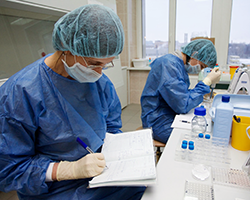The World Health Organization (WHO) has today released new guidance which recognize how people can actively take decisions for their own health and the health of their loved ones. The new WHO Consolidated Guideline on Self-Care Interventions for Health provides evidence-based recommendations on specific self-care interventions that can help to ensure quality health and well-being, and to promote and protect human rights.
The recommendations cover diverse interventions, from self-sampling for human papillomavirus (HPV) to improve cervical cancer screening, to self-administration of injectable contraception to prevent unintended pregnancy. They are available in one user-friendly and easy-to-navigate online platform.
About self-care
 Self-care has been practiced by people worldwide for thousands of years. The ability of individuals, families and communities to promote health, prevent disease, maintain health, and to cope with illness and disability with or without the support of a health worker, is nothing new. But new products, information and technologies are changing – and have the potential to change – how people access healthcare, as well as how they care for themselves and others.
Self-care has been practiced by people worldwide for thousands of years. The ability of individuals, families and communities to promote health, prevent disease, maintain health, and to cope with illness and disability with or without the support of a health worker, is nothing new. But new products, information and technologies are changing – and have the potential to change – how people access healthcare, as well as how they care for themselves and others.
Such products, information and technologies for self-care – or self-care interventions – can include high-quality medicines, devices, tools to test and diagnose, and digital tools. They can be provided within or outside of a health-care facility, with or without the support of a health worker.
The COVID-19 pandemic shone a light on the importance of self-care, and the importance of self-care interventions to help maintain essential health services to people. Even when there are major disruptions to the national health systems, high-quality and evidence-based self-care interventions can provide an important alternative if the usual health facility- or health worker-based services become unavailable or restricted.
“With these new guidelines it is our sincere hope that the essential role people play in managing their own health is further acknowledged and promoted through a supportive health system,” says Manjulaa Narasimhan, scientist at WHO Department of Sexual and Reproductive Health and Research including the special joint-UN programme HRP.
“Whether it’s for their experience of pregnancy and childbirth; managing fertility intentions, preventing sexually transmitted infections; enjoying better sexual health of themselves or their partner, or self-monitoring their blood pressure, access to quality self-care interventions can help meet people’s many health needs and rights.”
New recommendations and good practice statements
The new guidelines consolidate both new and existing recommendations on self-care interventions which can help to meet the health needs for people worldwide – and particularly in settings with the fewest resources and least infrastructure.
New recommendations include:
- Over-the counter pharmacy provision of pregnancy self-tests;
- pharmacy access to emergency contraception (or “the morning-after pill”)
- availability of lubrication to help individuals improve their sexual health and pleasure;
- Self-management of iron and folic acid supplementation being made available as an option during pre-pregnancy, pregnancy and postnatal periods
- self-monitoring of blood glucose during pregnancy;
- self-monitoring of blood pressure during pregnancy;
The new recommendations are accompanied by a series of good practice statements, which cover the following areas: 1) Human rights, gender equality and equity; (2) Financing and economic considerations; (3) Training needs of health workers; (4) Population-specific implementation considerations; (5) Digital health interventions; and (6) Environmental considerations.
Complementing primary health care
Ensuring such good practice is crucial to ensure that self-care interventions are provided as a necessary addition and component of high quality and human rights based primary health care – and not instead of high-quality health programmes and services.
Safe and strong linkages between individuals’ self-care and access to quality health care (when wanted or needed) is critically important to avoid harm. Where self-care is not a positive choice but is prompted by fear or lack of alternatives, it can increase vulnerabilities and put people’s well-being at risk.
Research needed
The new guidance is considered a “living guideline”, which will allow for continual review of new evidence and information, so that appropriate guidance can be issued in a timely manner and adopted and implemented by countries and programmes.
The foreword from Dr Soumya Swaminathan, WHO Deputy Director General, Science Division, as well as the concluding chapter of the new guideline, highlight the crucial need for more and better-quality research and evidence to address the limitations of the evidence base.
As Dr Swaminathan notes, “Further data and rigorous research continues to be needed to ensure a strong, evidence base to promote the introduction, use and scale-up of self-care interventions.”











